 35 Of The Most Gruesome And Unsettling Paintings In Western Art
35 Of The Most Gruesome And Unsettling Paintings In Western Art
Sometimes, an artist's imagination reaches out to the darkest places in the human soul.
Disturbing and terrifying images come out on the canvas, and we get thrilled by the eeriness.
We’ve made a list of 35 of the most terrifying art pieces in Western Art, which will strike you with admiration and disturb you both with their background stories and their atmospheres at the same time.
35. "Big Electric Chair," Andy Warhol
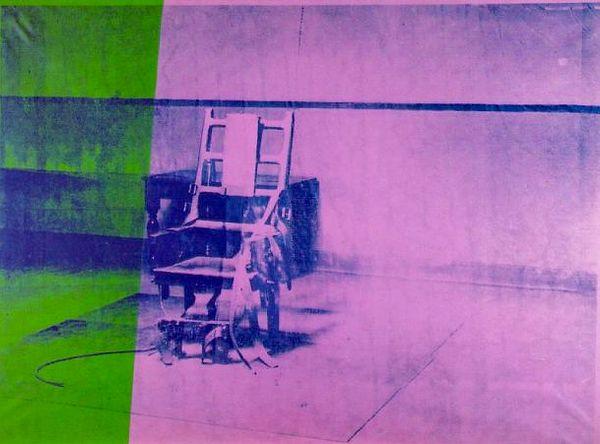
'Big Electric Chair' was created by Warhol, who was the pioneer of pop-art, in 1967. It is part of a series of works depicting an electric chair. Back then, death by electrocution was a controversial subject in New York and Warhol mainly worked on the subjects of “Death and Disaster” during these years.
34. "A Negro Hung Alive by the Ribs to a Gallow," William Blake
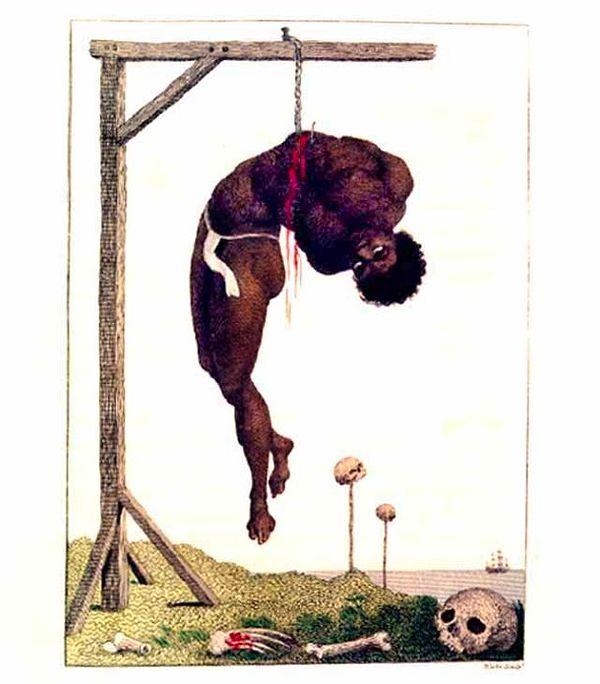
English poet and painter William Blake’s work depicts the cruelty of whites towards black slaves.
33. "Deterioration of Mind over Matter," Otto Rapp
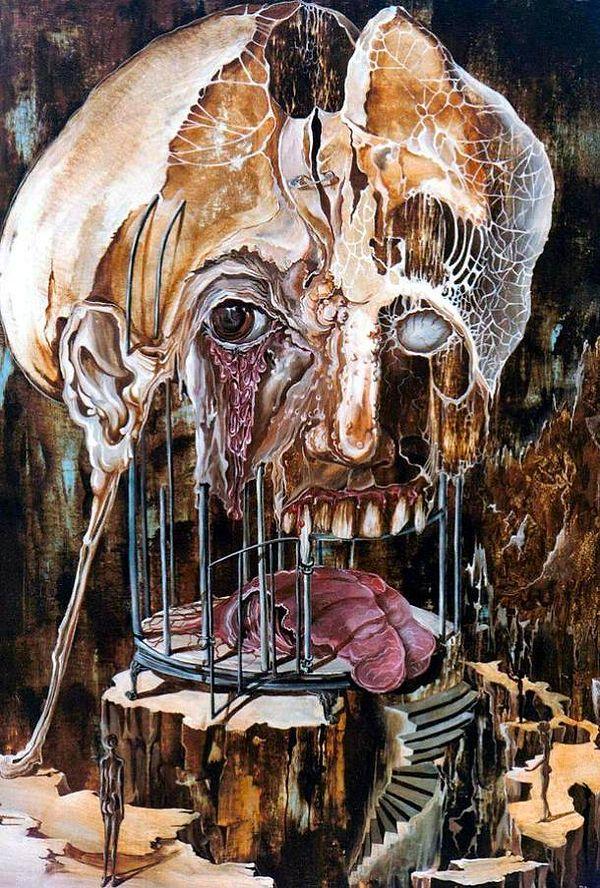
Austrian artist Otto Rapp depicts a decomposing human skull in a birdcage.
32. "The Water Ghost," Alfred Kubin
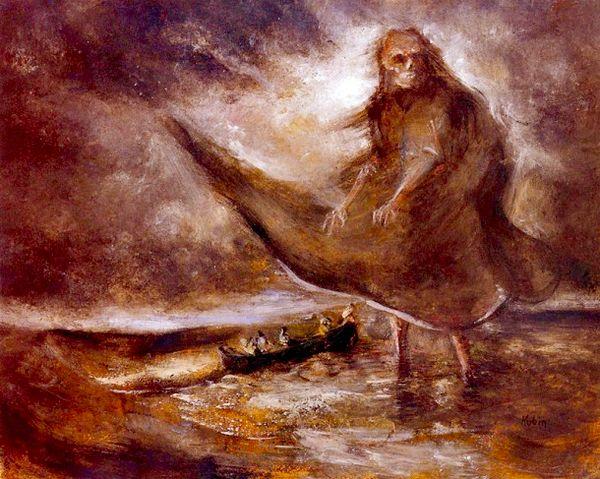
Kubin, whose work was labelled ‘degenerate’ by the Nazis, worked mainly in the symbolist and expressionist styles. And in this painting, a doomsday in the sea is depicted.
31. "Hell," Hans Memling
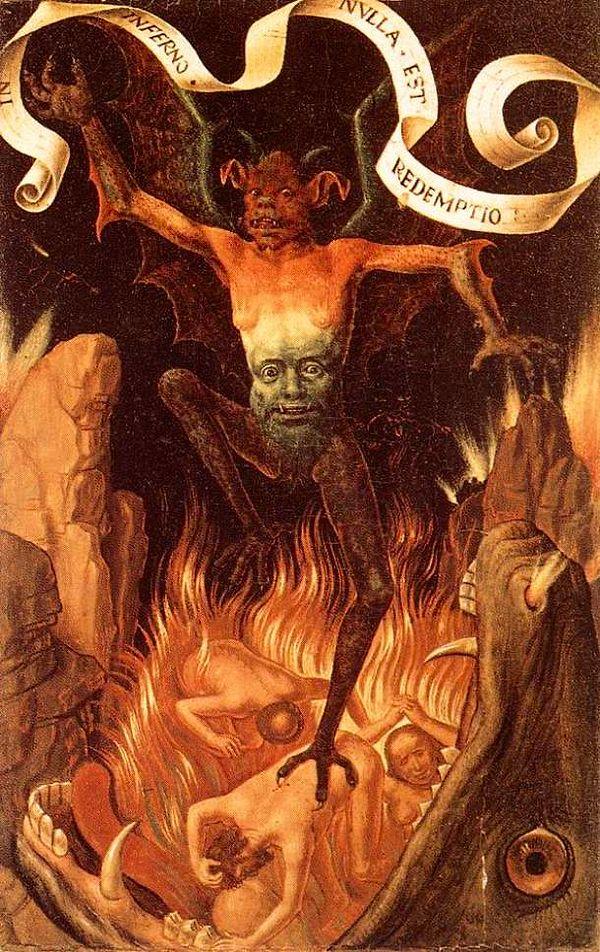
“Hell” shows Jesus sitting in judgment on the world, while St Michael the Archangel is weighing souls and driving the damned towards Hell.
30. "Anatomical Pieces," Theodore Gericault
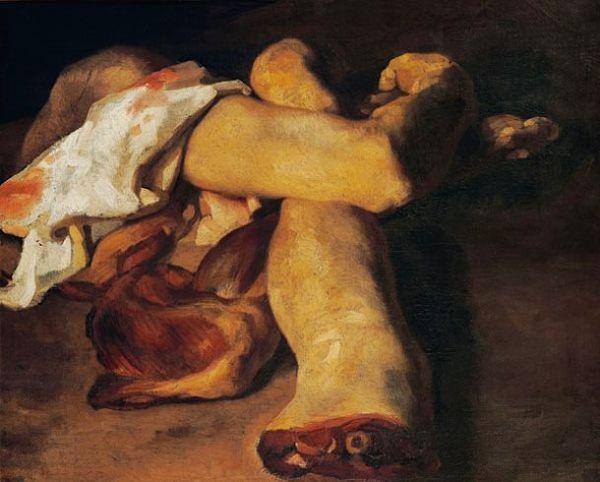
French painter Theodore Géricault used human remains from the morgue as subjects for this work.
29. "Lucifero," Francesco Scaramuzza
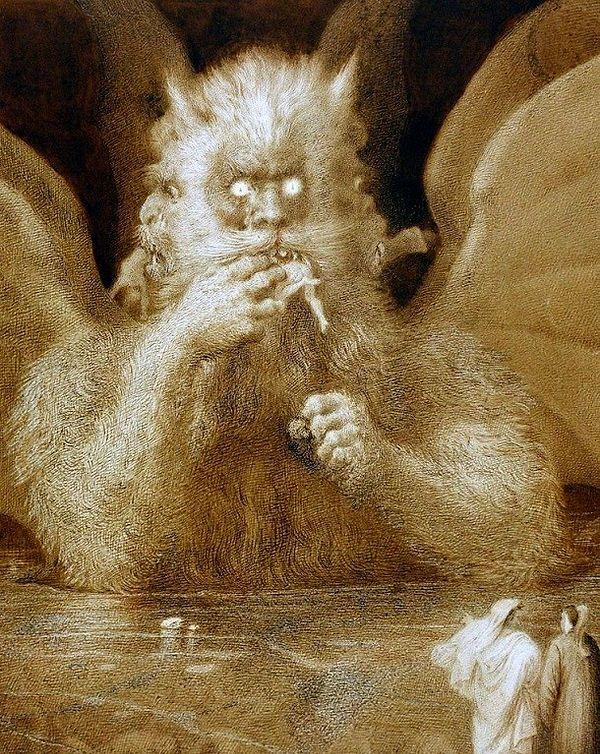
Francesco Scaramuzza was inspired by Dante's Inferno when painting Luciferno...
28. "Study after Velazquez´s Portrait of Pope Innocent X," Francis Bacon
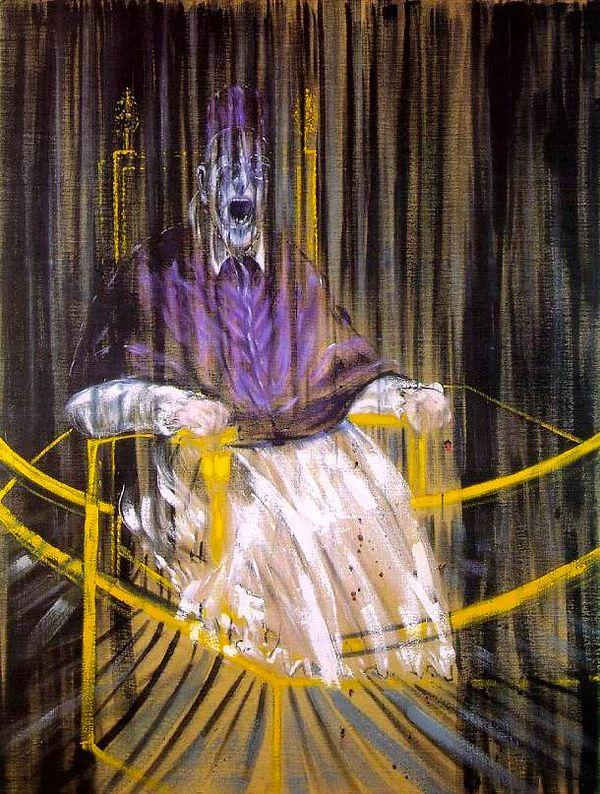
The work shows a distorted version of the Portrait of Innocent X painted by Spanish artist Diego Velázquez in 1650.
27. "Diomedes Being Eaten by His Horses," Gustave Moreau

'Diomedes Being Eaten by His Horses' depicts the dramatic climax from the 8th labor of Hercules, who was ordered to capture the four flesh-eating horses belonging to King Diomedes. Hercules killed the king in battle and fed his body to the horses.
26. "Necronom IV," Hans Rudolf Giger
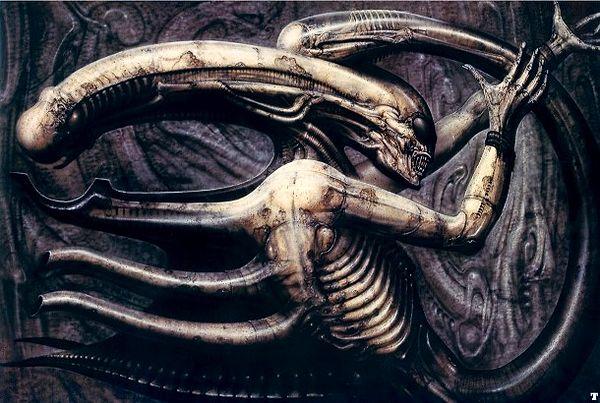
Giger was inspired by the movie “Alien” and all he went through during sleepless nights…
25. "Gallowgate Lard," Ken Currie
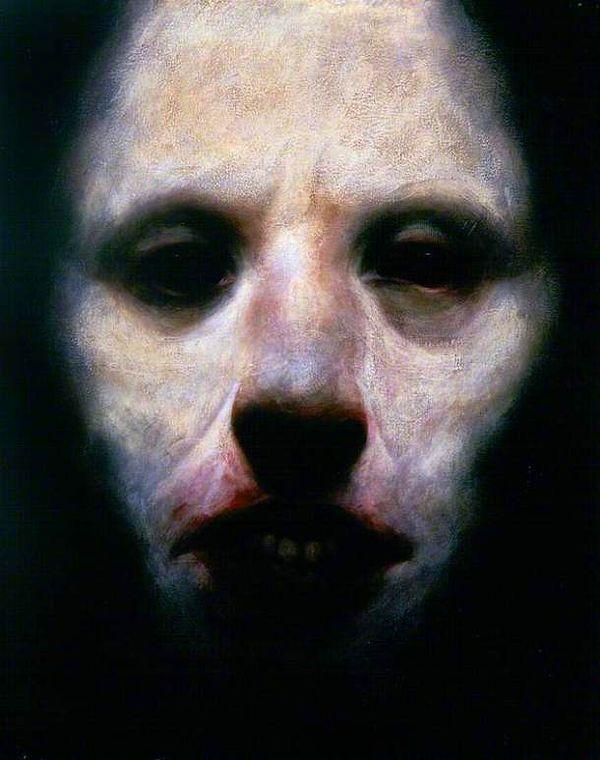
Inspired by Curri's own working class upbringing in North Shields, and an examination of the brutality and poverty of urban life in Scotland...
24. "Figure with Meat," Francis Bacon

The painting is based on 'the Pope Innocent X' by Diego Velázquez; however, in the Bacon painting the Pope is shown as a gruesome figure and placed between two bisected halves of a cow.
23. "A Puppet for the Niece," Santiago Caruso
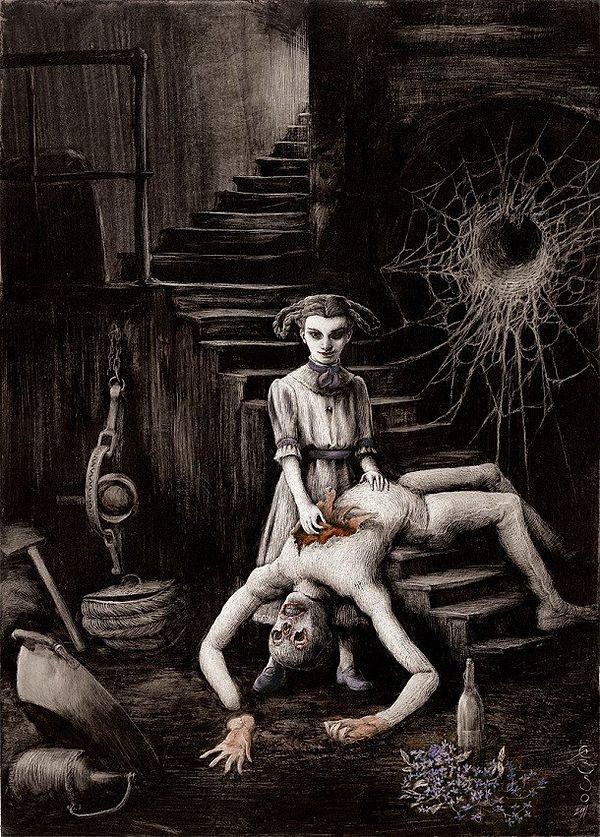
Born in Argentina in 1982, Santiago Caruso is known for his black-and-white symbolic art pieces. His limited color scheme and use of light creates a dark atmosphere in his works.
22. "Grave Goods," Jeff Christensen
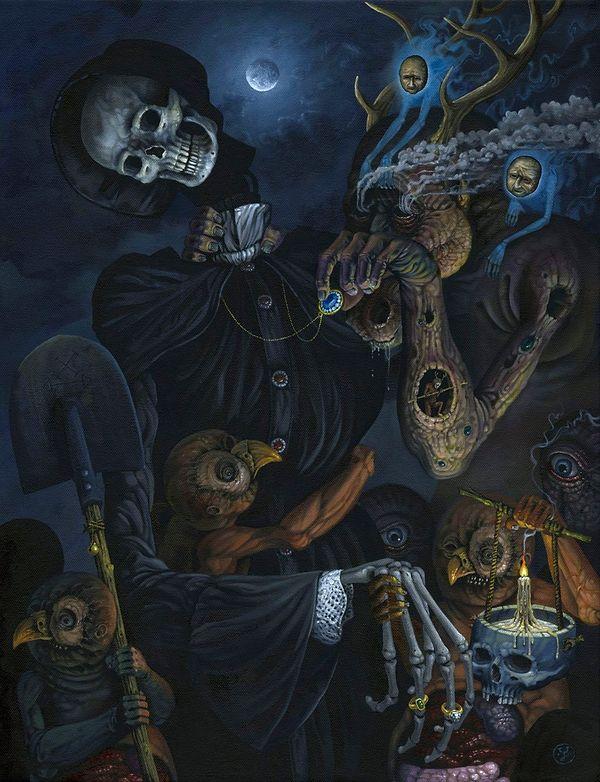
Jeff Christensen, an artist living in Salt Lake City, takes human nature as a 'grave good' in this work.
21. "Dante and Virgil in Hell" W. A. Bouguereau

Another work inspired by Dante's Inferno... In this scenery of violence, two damned souls fighting each other are depicted with Dante and Virgil watching them.
20. "A New You Could be Born Today," Santiago Caruso
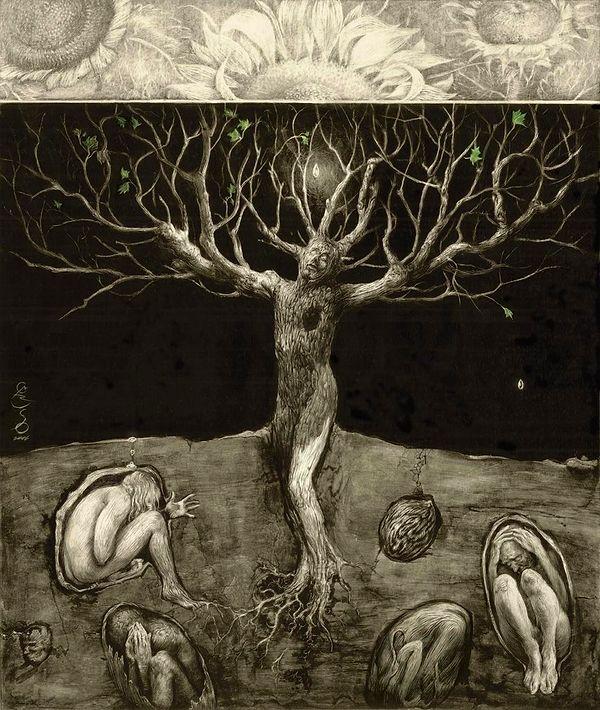
Santiago Caruso is in the list again with another apocalyptic painting...
19. "The Temptation of Saint Anthony," Matthias Grunewald
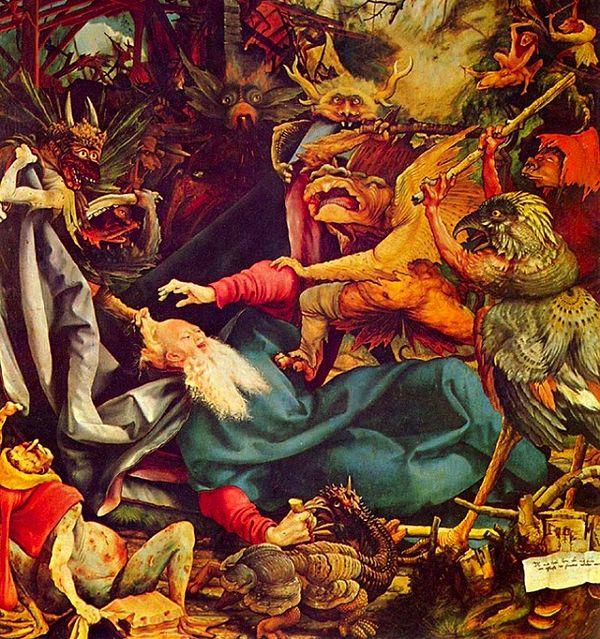
The Temptation of Saint Anthony is an often-repeated subject in the history of art and literature about a religious story. It was painted also by Hieronymus Bosch, Paul Cézane and Salvador Dalí, but one of the most striking ones is Grunewald’s oil-on-canvas work.
18. "The Flaying of the Corrupt Judge Sisamnes," Gerard David
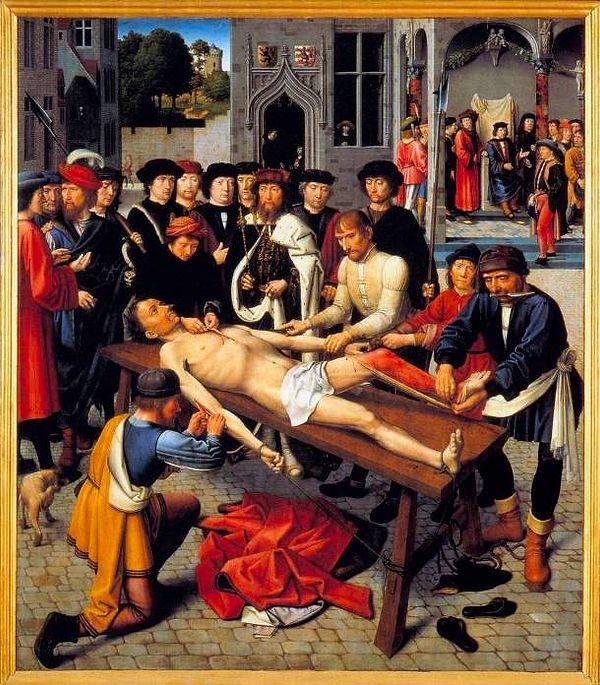
David's painting depicts the arrest and flaying of the corrupt Persian judge Sisamnes on the order of Cambyses, based on Herodotus's Histories.
17. "The Flaying of Marsyas," Titian
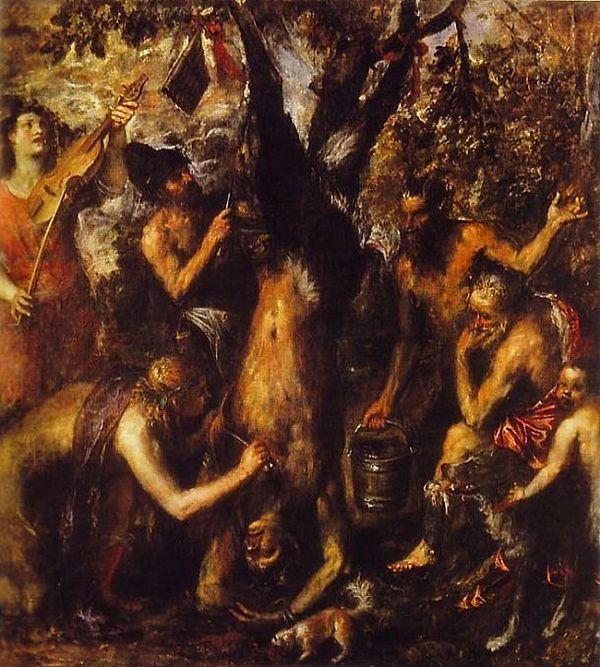
The Italian late Renaissance artist Titian's painting is part of a series with mythological themes. It portrays the flaying of Marsyas, a silenus who dared to defy the God Apollo.
The choice of such a crude scene was probably inspired by the death of Marcantonio Bragadin, a Venetian commander who was flayed by the Ottomans in that period.
16. "Head of an Idealist," Ken Currie
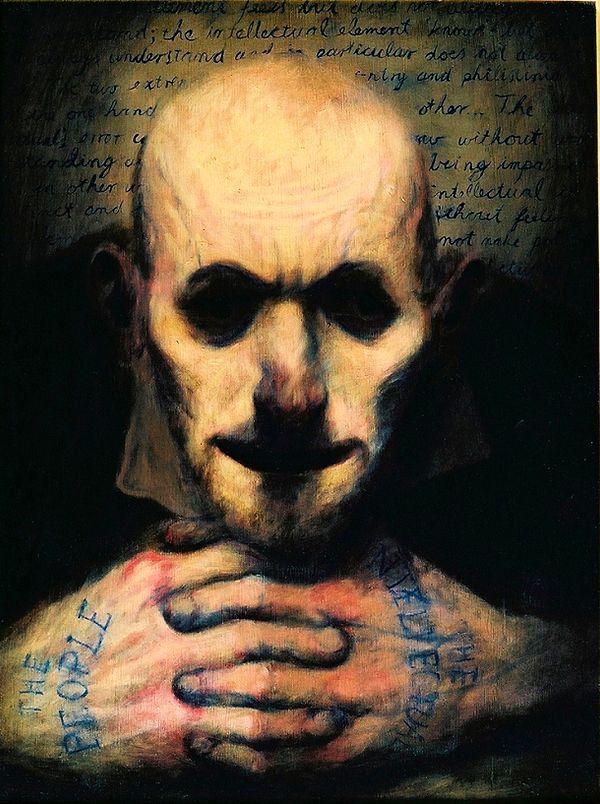
The “Idealist” seems to be in a thinking process with the words in the background. It’s thought that Currie portrays the rivalry between “intellectuals” and “ordinary” people in this painting.
15. "The Scream," Edvard Munch
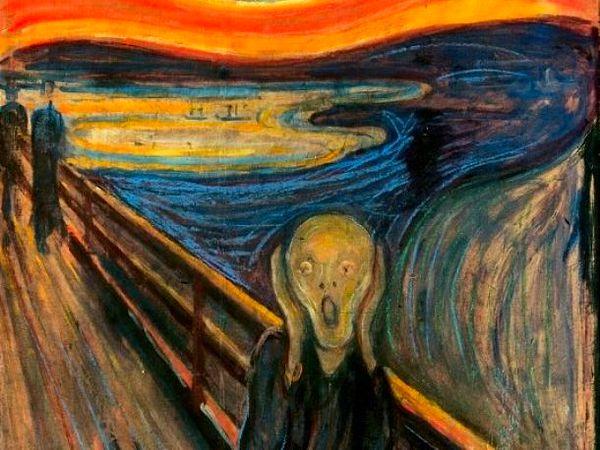
Norwegian artist Edvard Munch is often thought to be depicting the scream of an existential angst in this famous work of his.
14. "Saturn Devouring His Son," Francisco Goya
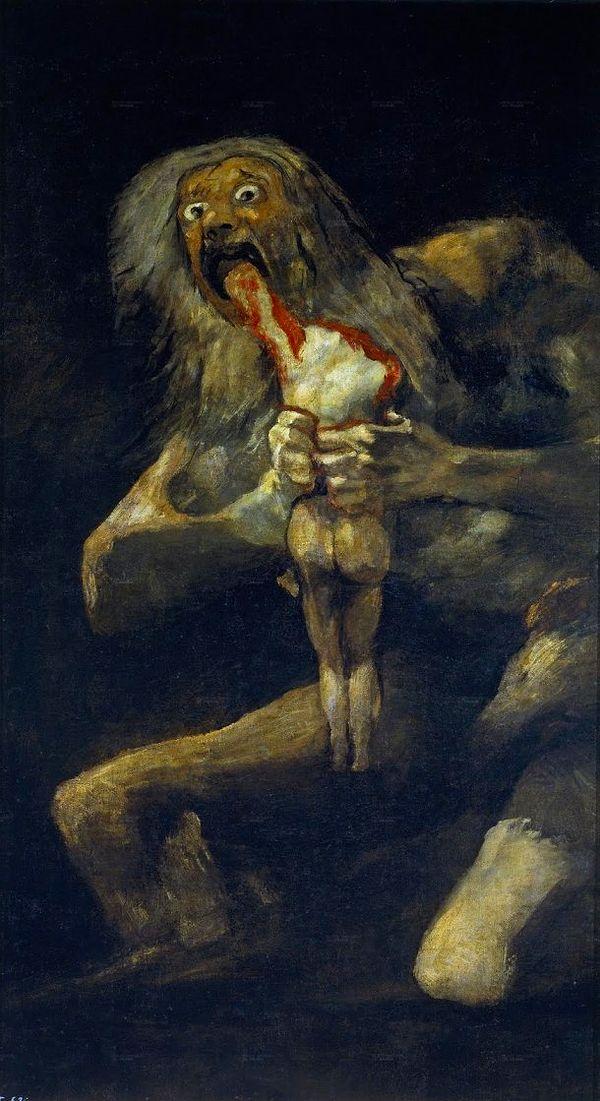
According to the traditional interpretation, it depicts the Greek myth of the Titan Cronus, who fears that he would be overthrown by one of his children, and ate each one upon their birth. The work is one of the 14 Black Paintings that Goya painted directly onto the walls of his house between 1819 and 1823.
13. "Death and the Miser," Hieronymus Bosch
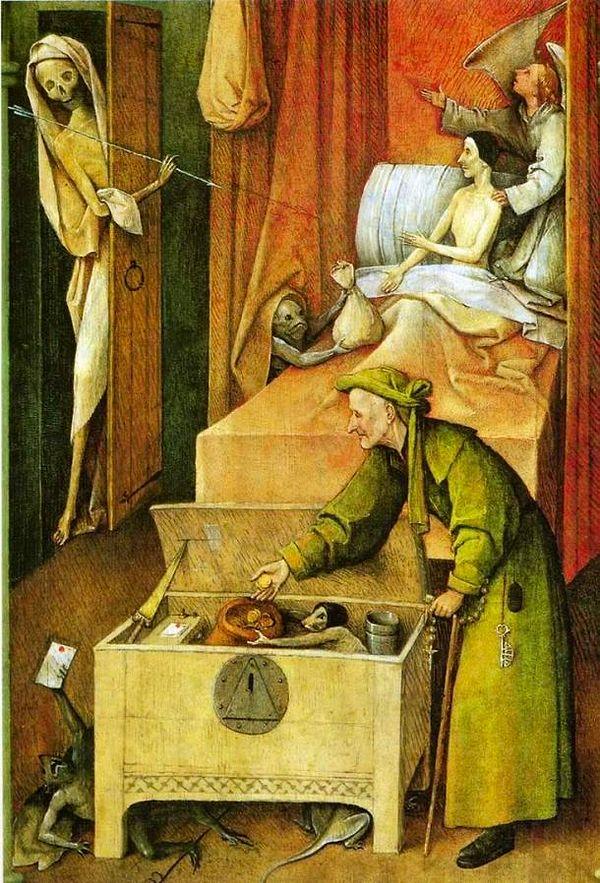
The 15th-century painting depicts the last moments in the life of a miser. A demon holding a fiery lantern and a rat-faced beast inside the chest, holding a bag of gold. On the left, a skeleton enters the room with an arrow in his hand...
12. "Dulle Griet," Pieter Bruegel the Elder
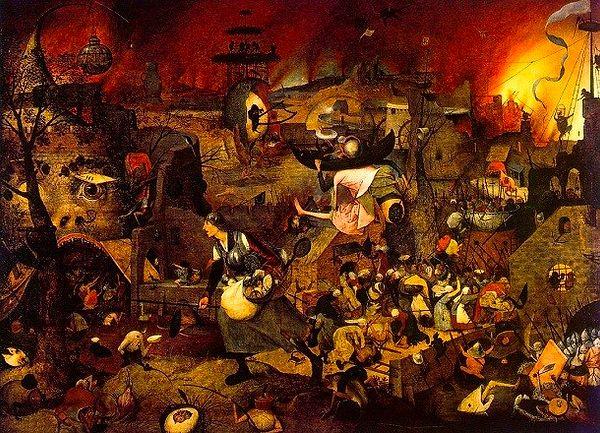
Also known as Mad Meg, 'Dulle Griet' is a figure of Flemish folklore. The painting depicts a peasant woman, Mad Meg, who leads an army of women to pillage Hell.
11. "The Last Judgment," Fra Angelico

'The Last Judgment' is a depiction of the Second Coming of Christ and the final and eternal judgment by God of all humanity.
10. "The Nightmare," Henry Fuseli
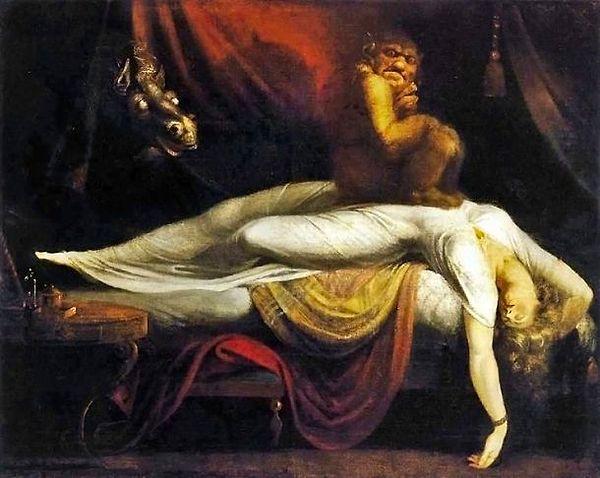
The Nightmare seems to portray a dreaming woman and the content of her nightmare. The incubus and the horse's head may refer to contemporary belief and folklore about nightmares.
9. "Study of the Heads of Torture Victims," Théodore Géricault
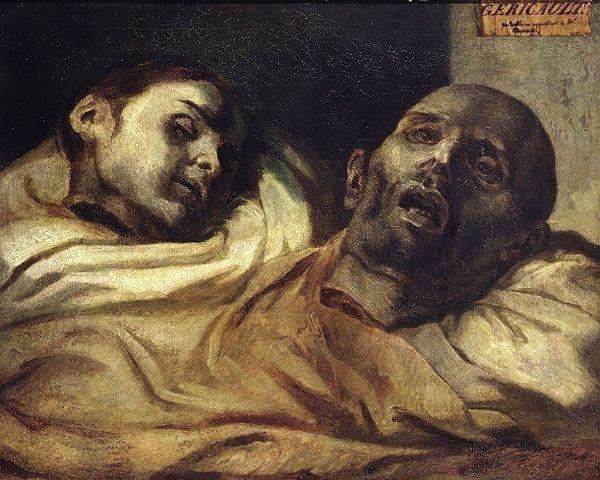
Géricault, one of the pioneers of the Romantic movement, is known for his works concerning the desperation of the post-revolution era. He uses real body parts as models.
8. "The Massacre of the Innocents," Peter Paul Rubens

The Massacre of the Innocents is the subject of two paintings by Peter Paul Rubens depicting the episode of the biblical Massacre of the Innocents of Bethlehem. It’s thought that he was influenced by another great painter, Caravaggio.
7. "The Great Body," Fábio Magalhães
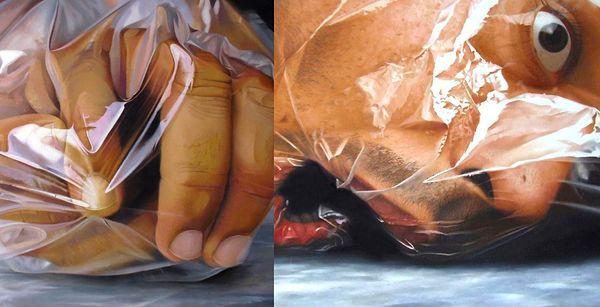
This gruesome, hyperrealist oil painting depicts a dead body wrapped in plastic.
6. "Degas is Aged," Valério Carrubba
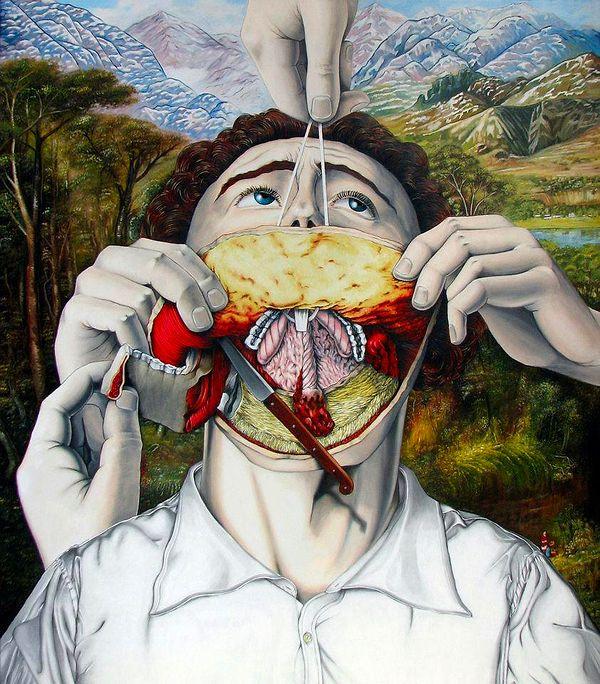
Almost a hundred years ago, Carrubba produced hyperrealist art pieces that challenge the usual depictions of human anatomy.
5. "Night Creeper," Zdzisław Beksiński

The Polish painter, photographer and sculptor produced in the field of “dystopian surrealism.” He was very successful at creating dark, creepy atmospheres in his work.
4. "Saturn Devouring His Son," Peter Paul Rubens
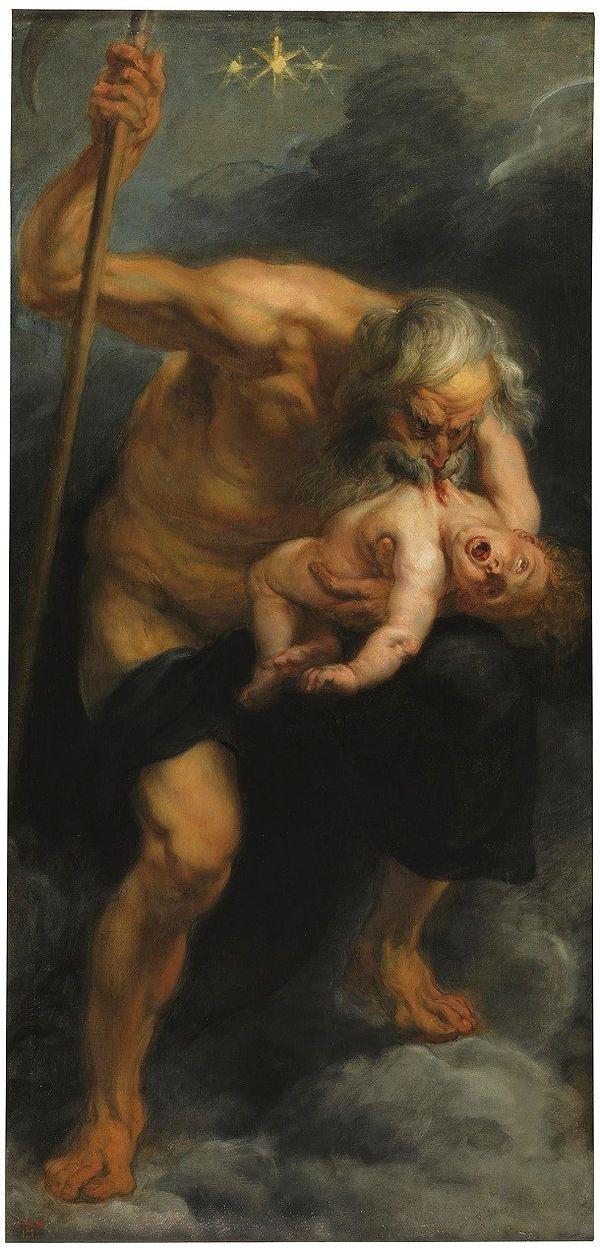
The same theme was used by Goya, as you see in the 14th painting in this list. This time it’s even more unsettling, isn’t it?
3. "The Death of Marat," Edvard Munch
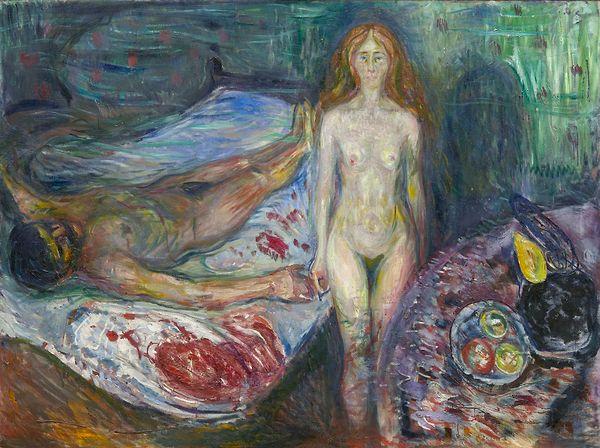
The Death of Marat was a painting by Jacques-Louis David of the murdered French revolutionary leader Jean-Paul Marat. It was one of the most famous images of the Revolution. In Munch's version, however, the malignant woman dominates the proceedings.
2. "The Face of War," Salvador Dalí
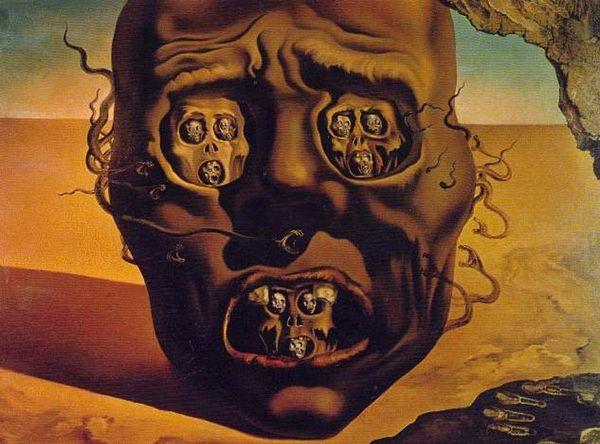
This work was painted between the end of the Spanish Civil War and beginning of the Second World War, and it depicts the horrors of such a violent era in history.
1. "Judith Beheading Holofernes," Caravaggio
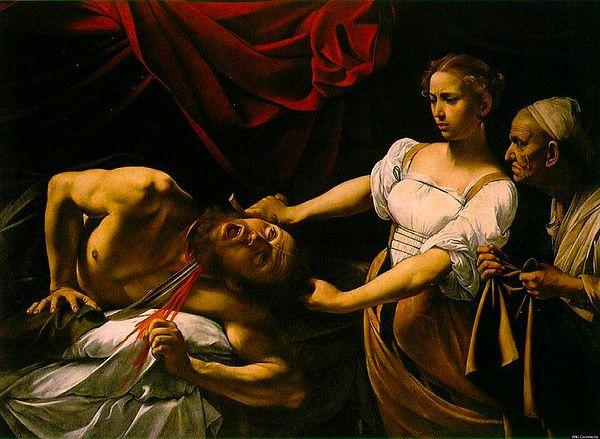
The story of Judith inspired many other great painters, including Artemisia Gentileschi, and is one of the most important female painters in art history, but probably the most famous version of the story is that of Caravaggio’s.
The deutero-canonical Book of Judith tells how Judith served her people by seducing and pleasuring Holofernes, the Assyrian general. Judith gets him drunk, then seizes his sword and slays him: 'Approaching to his bed, she took hold of the hair of his head.'
Keşfet ile ziyaret ettiğin tüm kategorileri tek akışta gör!


Send Comment